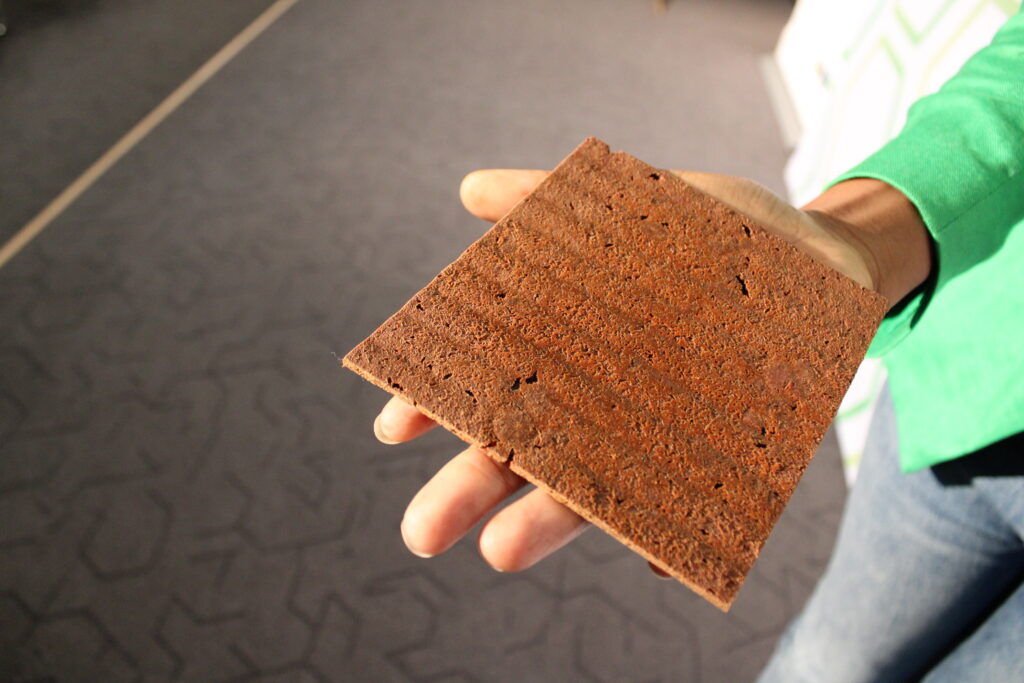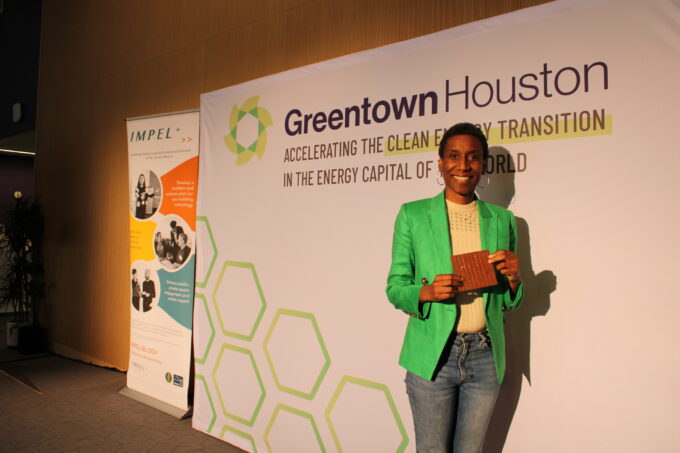If you look around, you can probably spot countless things made of polyvinyl chloride (PVC) plastic—from shower curtains, to credit cards, to roofing, to protective clothing.
PVC is a synthetic plastic polymer made from fossil fuels, and it forms one of the most common types of plastics. In addition to being a petrochemical, it’s harmful to people—look no further than the East Palestine, Ohio train derailment—and takes hundreds of years to break down in landfills. Compounding these threats to both people and the planet is the fact that PVC is mainly made in China, meaning high emissions are associated with shipping it to other parts of the world. PVC made using forced labor in China is also being stopped at U.S. borders by the Uyghur Forced Labor Prevention Act.
Fortunately, frakktal has a solution. Its biobased polymers are a direct replacement for PVC, and its first product tackles the building industry, which utilizes 70 percent of the PVC produced each year.
frakktal’s polymers are built from proprietary “agricultural overages”—think byproducts from production of certain foods and beverages, for example, that would otherwise be disposed of. Its climate benefits over PVC polymers are overwhelming, from not using fossil fuels as feedstock, to not requiring high manufacturing temperatures, to not incorporating any harmful chemicals. The startup’s polymers are circular, meaning they can be used as a feedstock to create more product; if the product was disposed of, however, it’s compostable. frakktal also prioritizes local feedstock sourcing, production of its polymers, and deployment of its product, meaning that shipping-related emissions are low.
The startup’s beachhead market is the flooring space, although its polymer can be utilized across industries.

When people learn about frakktal and its mission, its Founder and CEO jhana porter hopes they are inspired to think critically about the makeup and circularity of objects they interact with.
“I want everyone to have awareness of what the things they interact with are comprised of—not only the materials, but the lifecycle of things, where things are sourced, who had their hands on them, who’s impacted by that sourcing and manufacturing,” she says. “I think it’s really important to have a mindfulness about the entire process, so that you’re an informed consumer and customer.”
In fact, this type of curiosity was the spark for frakktal. porter is a dedicated yogi, and when a classmate unrolled an odorous new mat, she began exploring the health and climate impacts of materials in athletic mats.
Not long after, porter—a chemist by trade—was laid off during the COVID-19 pandemic, and moved back to her hometown of Houston, TX. This development catapulted her deeper into the world of polymers; without access to labs and equipment, she began doing proof-of-concept experiments in her kitchen, using tools including blenders and meat and coffee grinders.
“I spent the height of the pandemic becoming a polymer scientist,” porter says.
As the pandemic eased, porter incorporated frakktal and went through several accelerators to zero in on the startup’s technology focus and initial applications.
frakktal intends to license its technology to existing manufacturing facilities, and is currently raising pre-seed funding. This round will support hiring, the completion of current pilots, and the advancement of the startup’s tech from TRL 4 to 6.
frakktal became a Greentown Houston member in January 2023, and recently joined the inaugural cohort of ACCEL—an accelerator from Greentown and Browning the Green Space (BGS) designed to support BIPOC-led startups by offering access to funding, networking connections, resources, and opportunities that structural inequities put out of reach. The program combines acceleration with a curated curriculum, incubation through Greentown membership, and extensive mentorship from Greentown and BGS’s networks of industry experts.
While the year-long accelerator has just begun, porter says it’s already been helpful to be connected to fellow founders, and is excited to learn from the mentors she’s been paired with. frakktal has also benefited from tapping into Greentown’s network of key ecosystem leaders.
“Greentown has been like rocket fuel for the company,” porter says. Emission-free rocket fuel, that is!


